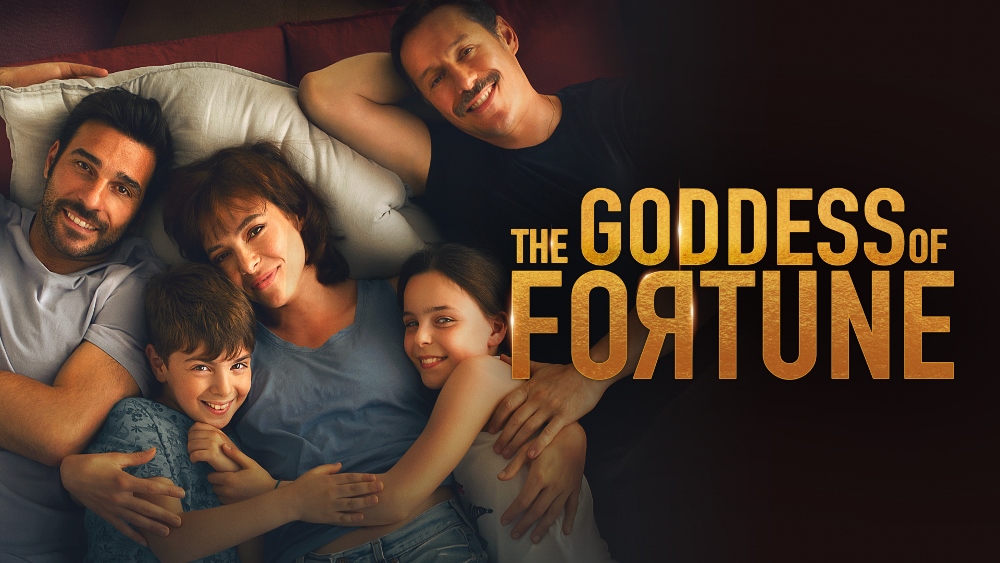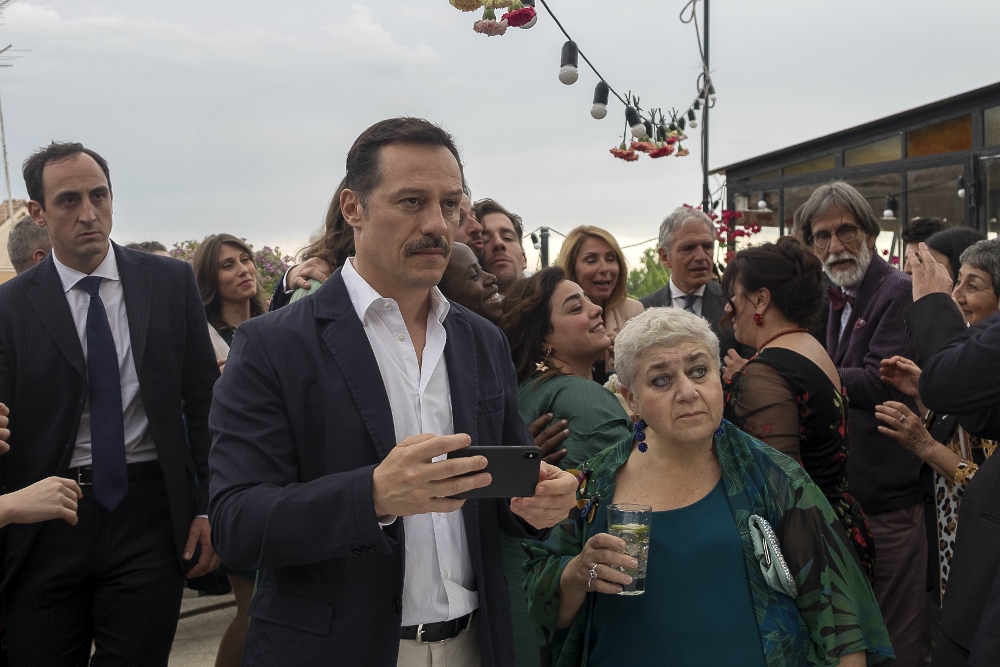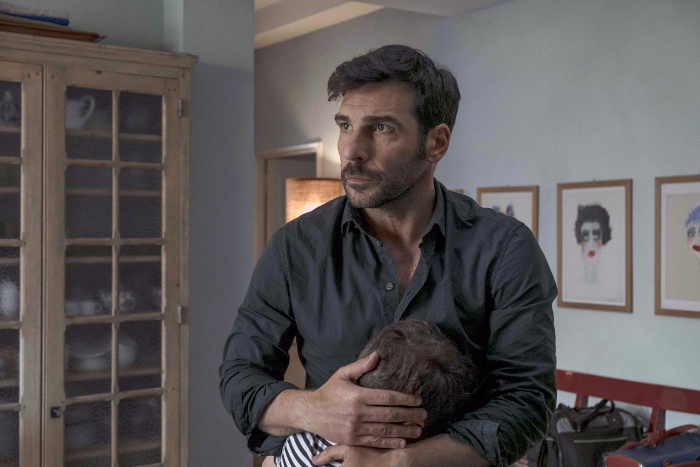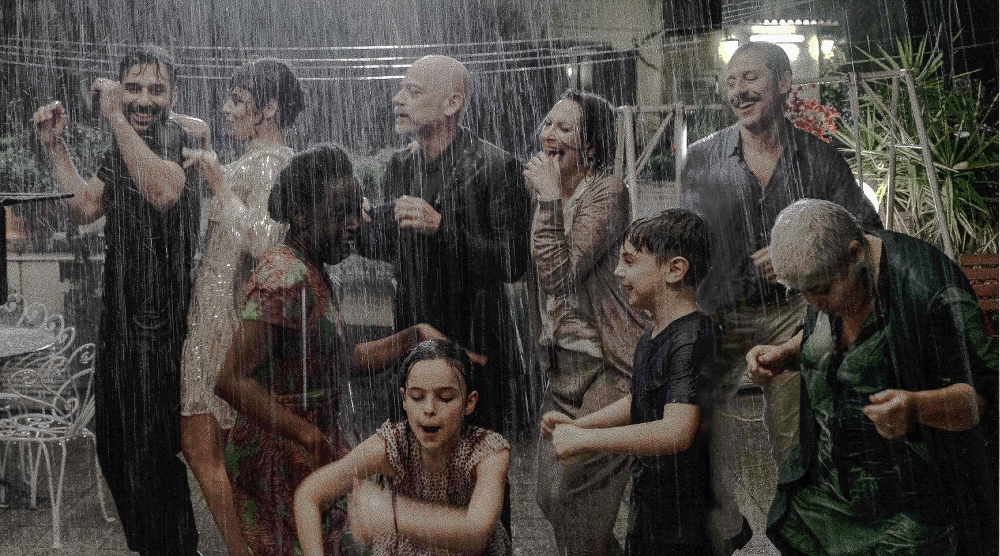
What comes after happily ever after? In The Goddess of Fortune director Ferzan Ozpetek looks at love with a compassionate, yet unsentimental gaze. Alessandro and Arturo have been together for 15 years, when an unexpected turn of events brings new challenges and pressures into their lives, as underlying tensions, secrets, and silently nurtured resentments rise to the surface. Their close friend Annamaria comes to visit, asking them to look after her two children for a few days while she goes into the hospital for tests. Although the initial elements of the plot are familiar, with potential for predictability and melodrama, Ozpetek chooses a different path. None of the characters are idealized saints, victims, heroes or villains (well, maybe one villainess). Fully realized, vibrant and wonderfully flawed, they capture the heart and invite the viewer’s empathy with sensitive, nuanced, performances by the principals and ensemble cast.
Introducing a theme of beginnings and endings, the film opens with mystery and a sense of foreboding: a fresco of skulls on the walls of an elegant villa, a child’s voice crying out in distress. Then it cuts to a colorful celebration, crowded with people, cake and flowers, the camera shifting with a hand-held, home movie feel. It’s the wedding of a young, gay, couple, hosted by Arturo (Stefano Accorsi) and Alessandro (Edoardo Leo), evoking the bright hopes of new love. The movement in this scene establishes a sense of intimacy, shifting from one conversation to another, as characters are introduced in the lively flow of party atmosphere. When Annamaria (Jasmine Trinca) arrives, the intensity of her relationship with Alessandro is impossible to miss, as is the tension between Arturo and Alessandro.

As a longtime couple, Alessandro and Arturo have long since established ground rules. Sex with other people is OK, as long as it does not interfere with their relationship. It’s a good system, as long as everyone follows the rules. They also have the kind of arguments that long-time couples have, with accusations like ‘it’s not what you did, it’s how you did it.’ Suddenly saddled with Martina and Sandro (aged 12 and 10 respectively), they try to cope, but it’s not easy.

Alessandro, a plumber, is a very confident, handsome man with a hands-on, direct approach to life that works well with the children, who take to him instantly. Arturo, who works from home as a translator, is more hesitant, remote, introverted. Some of the most powerful scenes are those that convey the minor scenes of life, those mundane, daily events – cooking, doing homework, arguing. As Arturo struggles with Martina’s math, and Alessandro giggles hopelessly over a history lesson with Sandro, the two men exchange a glance full of love and understanding. They know one another so well, but, as Arturo asks, “is it enough?”
The lives of the couple, as well as the film, are enriched by an extended family of choice – their friends and neighbors. They are present throughout the film, there to help, consult with, share dinners and picnics, laugh, cry, sing and dance. Serra Yilmaz is memorable as Esra, smart, funny, and very much an individual. Giving Arturo relationship advice, she says that she too is in a long-term relationship with “incredible sex” – with herself. Esra’s daughter Mina (Christina Bugatty), a trans woman, is lovely and full of energy, checking out a dating app on her phone to distract herself from the gloom of a hospital visit, then happily skipping over to join Annamaria and the kids on a bench, as they sing Mina’s (Italian singer Mina Mazzini) Chihuahua. Jasmine Trinca imbues Annamaria with a joyous spirit as well as resilience, while the children, portrayed respectively by Sara Ciocca and Edoardo Brandi deliver a very natural performance, reflecting the anxieties and need for affection and reassurance during such a stressful time. The nurse at the hospital (Barbara Chichiarelli) adds spice with her tough voice and down-to-earth approach; her heavy work load does not prevent her from noticing Alessandro’s appeal. Barbara Alberti is impressive and terrifying as Annamaria’s mother, a Sicilian baroness.

As the narrative unfolds in some unpredictable ways, one comes to know different aspects of the characters, their strengths, and weaknesses. Embracing the different choices and never-ending changes of life, The Goddess of Fortune is a heart-warming and moving celebration of life and love.
The Goddess of Fortune
Italy, 2019, 114 min, Italian with English subtitles
Directed by Ferzan Ozpetek; Screenplay: Ozpetek, Silvia Ranfagni, Gianni Romoli; DOP: Léon Diana; Cast: Stefano Accorsi, Edoardo Leo, Jasmine Trinca, Sara Ciocca, Edoardo Brandi, Barbara Alberti, Serra Yilmaz





